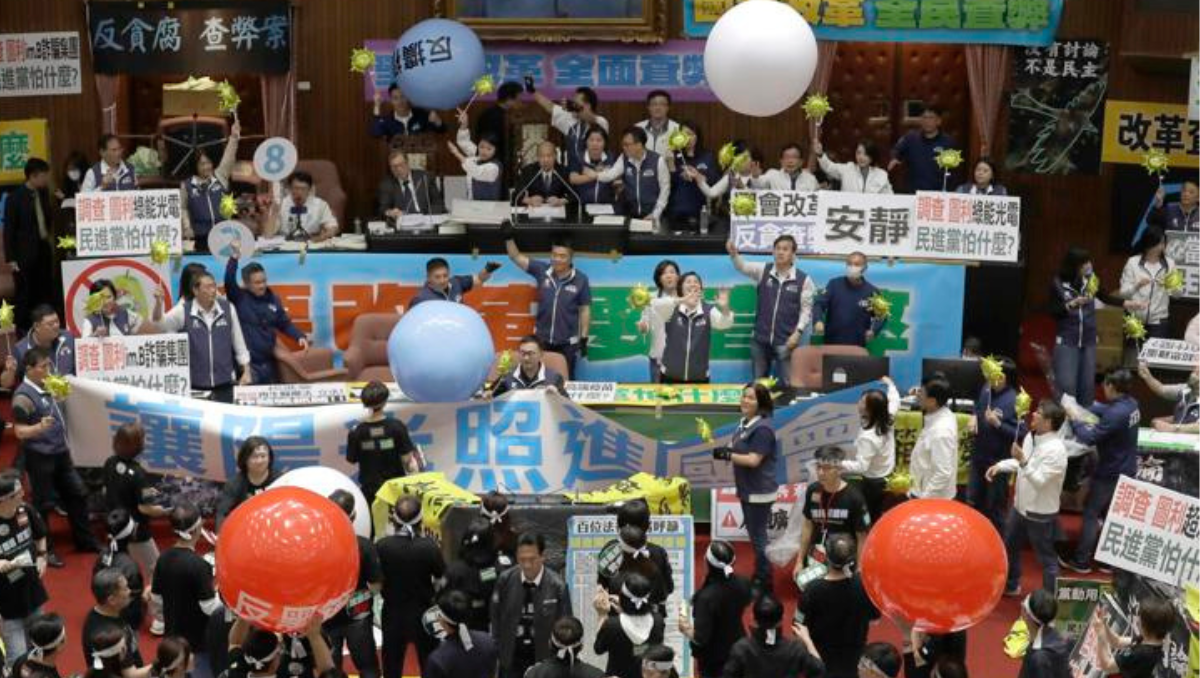A series of legislative changes have been approved by Taiwan’s opposition-controlled parliament, giving legislators more ability to probe the administration of newly elected President Lai Ching-te. The China-friendly Kuomintang, or KMT, and the smaller Taiwan People’s Party, or TPP, used their combined majority to force through the agreement on Tuesday despite days of rallies that have drawn hundreds of thousands of people since May 17. To become law, the bills still need to be signed by the president.
Background
Taiwan broke apart from China in 1949 due to a civil war, and the Nationalists, commonly referred to as the KMT, formally want reunification with China. The Nationalists, who have fallen short in three straight presidential elections but maintain local authority due to intricate networks of social and commercial interests, ruled Taiwan under martial law for forty years. Following the January elections, they secured a one-seat majority in the legislature, and Lai Ching-te who heads the Democratic Progressive Party—a party hated by Beijing was elected president. Lai favours Taiwan’s de facto autonomy from China.
Why are they advocating for it?
Lawmakers now have the authority to mandate that the president present annual reports and respond to inquiries from them, thanks to the revisions that were approved on Tuesday. Legislators have the authority to penalise or imprison government personnel for actions that they believe to be in “contempt of parliament.” Furthermore, the legislature now acquired more authority to oversee government spending programmes and investigate government initiatives.
This authority includes the ability to request information from the military, commercial enterprises, or individual citizens that is thought to be pertinent to parliamentary inquiries. Additionally, the bill gives the legislature more authority over expenditures, notably those related to defence. The perception exists that those in opposition are more amicable with Beijing, which annexes Taiwan and hasn’t ruled out using force to bring about its desired unification.
It’s still uncertain if the set of laws will pass into law. Legislation may be overridden by the premier-led Executive Yuan, which has the authority to veto it or send it to the president, who must sign it into law within ten days. The proposals will not become law if the president or the Executive Yuan do not comply.
Protests gaining momentum
Thousands of protesters gathered outside the legislature on Tuesday to continue their days-long protest against the legislation. Banners endorsing both sides of the controversy decorated the parliamentary chamber, and debates on the floor descended into brawls and push-ups.
Legislators from the DPP (Democratic Progressive Party) charged that KMT and TPP deputies were weakening Taiwan’s democracy by pushing through policies that were either ill-defined or an abuse of authority, and that their passage was accomplished without adequate consultation. During the bill’s vote, governing party lawmakers hurled paper aero planes and trash bags at their opposition colleagues.
The attempt by the KMT and TPP to pass the laws has caused considerable fears in civil society as well as the academic community, despite their repeated claims that the bills will ensure accountability while offering the legislature greater authority to tackle corruption. A few demonstrators accused the opposition parties of weakening Taiwan’s democracy by pushing legislative changes through parliament quickly and without extensive talks including all parties.
Analysts suggest that the changes may give the opposition parties more confidence to investigate the Lai administration, which might hinder the implementation of policies and threaten national security.
President Lai is anticipated to use his constitutional power to ask lawmakers to reevaluate the measures despite growing pressure. Taiwan anticipates a political impasse since no party holds a parliamentary majority, which could influence social welfare and defence budgets.
China’s Intrusion in Taiwan
China regularly deploys ships and aircraft close to Taiwan as part of an intimidation campaign meant to weaken Taiwan and put pressure on its defences. Despite the absence of official diplomatic relations, the United States remains the territory’s most powerful political ally. Taiwan’s Ministry of National Defence stated on Monday that it had found 21 Chinese aircraft and 15 ships, but on Tuesday it reported only three Chinese warplanes and 11 naval and coastguard ships had been spotted in the previous 24 hours. Following Lai’s inauguration on May 21, Beijing demonstrated its might last Thursday by initiating extensive war games around Taiwan.
